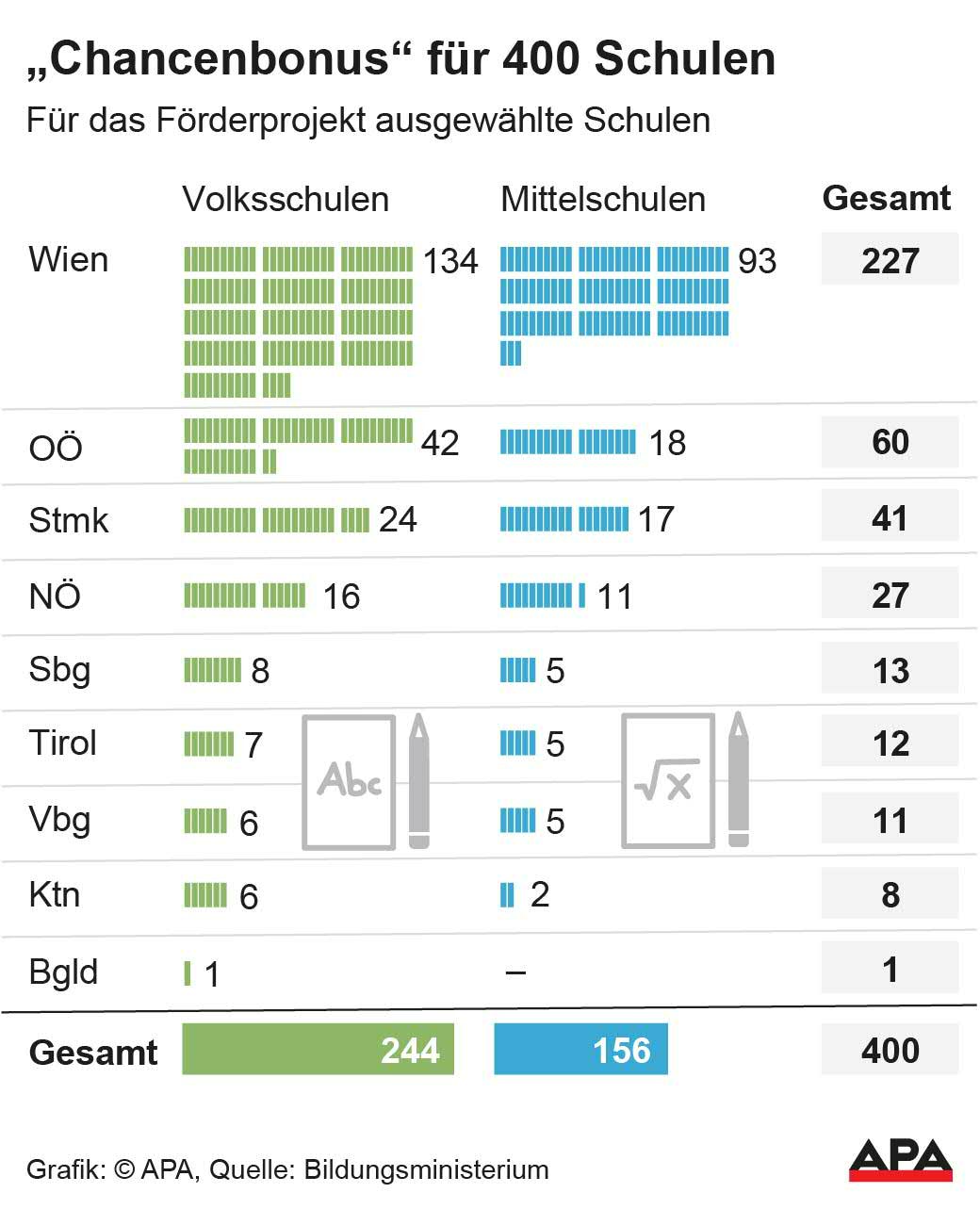"Opportunity Bonus" Comes for 400 Schools

"My goal is that the background of the parents or the origin is not the dominant distinguishing feature, but that all children and young people receive good and fair educational opportunities," said Education Minister Christoph Wiederkehr (NEOS) during the presentation of the "Opportunity Bonus".
112,000 Students Benefit from "Opportunity Bonus"
Starting from the next school year, 112,000 students will benefit from the program. According to the ministry, the 156 middle schools and 244 primary schools can decide whether they want additional staff in the form of teachers, school psychologists, school social workers, or social educators. The measure is expected to cost around 65 million euros annually. The government program had planned an additional 20 million euros from the school year 2027/28 "subject to budgetary constraints". An expansion of the program in the future is possible, says Wiederkehr. However, this would require additional budgets that would first need to be negotiated.
The 800 additional positions will primarily be allocated based on school size. Depending on the school, one to seven full-time equivalents would be assigned. Most schools are from urban areas. Unsurprisingly, most of the selected institutions are in Vienna with 227 primary and middle schools. In Upper Austria, 60 schools are invited to participate in the project. They are followed by Styria (41), Lower Austria (27), Salzburg (13), Tyrol (12), Vorarlberg (11), Carinthia (8), and Burgenland (1).

The 400 schools are to remain in the program for at least five years. Addressing the teacher shortage, Wiederkehr admitted that there could be regional problems in finding the desired staff. However, the shortage is no longer widespread, and the development is moving in "the right direction".
"Opportunity Bonus": Socioeconomic Background as Selection Criterion
The 400 schools were selected based on the socioeconomic background of the students - specifically using the so-called SÖL categories (Socioeconomic Background). Criteria for more resources include the proportion of parents at the location who have at most a compulsory school education or low income or no work, and the proportion of children who do not state German as their first language in everyday life or were born abroad.
The selected schools include all 296 of the "SÖL Category 1" as well as some of the institutions from "SÖL Category 2". Since all schools that have already participated in the previous project "100 Schools - 1000 Opportunities" can also participate in the new program, two institutions from "SÖL Category 3" were also invited.
According to the Opportunity Index of the Chamber of Labor (AK), which targets the criteria of students' language of communication and parents' educational level, there were 510 schools across all types in Austria in the 2022/23 school year with particularly great challenges, as stated in response to an APA inquiry.
The Social Democratic Teachers of Austria (SLÖ) responded positively to the "Opportunity Bonus". SLÖ leader Thomas Bulant: "Now those schools that have managed all the crises of recent years can celebrate. They will finally receive the support from the Ministry of Education that they need for their valuable work."
Praise for "Opportunity Bonus" from SPÖ, Greens, Business Representatives, and Vienna
Praise for the Opportunity Bonus came from SPÖ education spokesperson Heinrich Himmer, for whom the regulation does not go far enough. "Schools need more support and a comprehensive, long-term package for further relief. This also includes additional resources for other professional groups such as occupational therapists or speech therapists." The Green education spokesperson Sigrid Maurer referred to the project "100 Schools - 1000 Opportunities" created under Green government participation. "That this successful model is now being further developed and incorporated into the Opportunity Bonus is a right and necessary step."
Vienna's Deputy Mayor Bettina Emmerling (NEOS) sees a long-standing demand of the federal capital fulfilled. The Secretary General of the Federation of Austrian Industries (IV), Christoph Neumayer, also expressed satisfaction. The promised staff must now "quickly" and "uncomplicatedly" reach the schools. The Chamber of Commerce (WKÖ) expressed a similar sentiment. However, it also requires "as a large framework the implementation of compulsory education up to the 8th grade to ensure appropriate competency levels in reading, writing, and arithmetic," says Melina Schneider-Lugger, head of the WKÖ Department for Education Policy.
Criticism came from the FPÖ. They refer to the teacher shortage as "once again only half a story of the NEOS Education Minister". Wiederkehr shifts the responsibility to the schools, "although it would be his very own task as Minister to finally solve the problem of the teacher shortage," says FPÖ education spokesperson Hermann Brückl.
(APA/Red)
This article has been automatically translated, read the original article here.
Du hast einen Hinweis für uns? Oder einen Insider-Tipp, was bei dir in der Gegend gerade passiert? Dann melde dich bei uns, damit wir darüber berichten können.
Wir gehen allen Hinweisen nach, die wir erhalten. Und damit wir schon einen Vorgeschmack und einen guten Überblick bekommen, freuen wir uns über Fotos, Videos oder Texte. Einfach das Formular unten ausfüllen und schon landet dein Tipp bei uns in der Redaktion.
Alternativ kannst du uns direkt über WhatsApp kontaktieren: Zum WhatsApp Chat
Herzlichen Dank für deine Zusendung.


